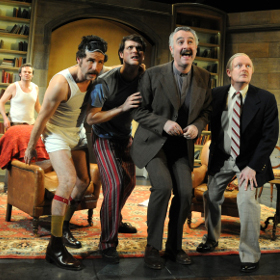Michael Coveney: Tales of the river with funny Frayn and rare Tennessee

© Alastair Muir
There used to be – still is, I've just checked – a company called Mikron Theatre which criss-crossed the country in a canal boat, stopping off at riverside pubs and community centres to perform plays and chronicles about life on the water, the agricultural landscape, local history, and so on.
There's something about river running through theatre that is highly appealing, a thought prompted by a visit last night to catch Michael Frayn's Donkey's Years at the Rose in Kingston and a weekend hop across to Little Venice to see a rare, early Tennessee Williams play in the Canal Cafe which has been open for business (mostly topical revue) since 1979.
Frayn's play is about a college reunion in Cambridge, where high jinks along the Backs, the riverside lawns abutting several of the colleges, results in midnight dips and immersions, with or without clothes. The Thames at Kingston has risen quite high, but there's no flooding in this part of town, and it was a quiet, dark Monday night along the towpath.
Still, when a theatre's near a river, you always sense its proximity in the foyers and indeed the play itself. There's a special atmosphere, and it doesn't have to be as close as the water actually rising on the stage, as it did at the National some time ago in Alan Ayckbourn's Way Upstream, providing crises and technical challenges beautifully recounted in Daniel Rosenthal's National Theatre Story.
The most water-drenched production recently in London was probably Vesturport's Woyzeck at the Barbican. But the Barbican's not as close to the river as the National on the South Bank. And in neither can you actually hear the aquatic surges outside, as you sometimes can at the Mill at Sonning, or the Watermill at Newbury; the latter venue still has a bit of a river lock system inside the theatre, which once paid off big time for the mill race in a revival of Ibsen's Rosmersholm.
Maybe it's just the magic of being by the river when you go to the theatre and you're not even going to see Show Boat, the great Jerome Kern and Oscar Hammerstein musical set on the titular entertainment venue travelling along the Mississippi. And maybe this is why Samuel Adamson's Gabriel at Shakespeare's Globe was my favourite show of last year: in its tales of London folk and the river in the 17th century, with music to match, it was the perfect site-specific production.
It was delightful to see the Frayn play again, with its overgrown schoolboy behaviour, its cruel ostracism of the hapless Northern researcher, Snell, who never had rooms in college and is treated throughout as though he never existed anyway; Ian Hughes transforms this character into a Welsh nerd with a non-stop armoury of tick tack signs, sad symptoms of a loser who is both waving and drowning, literally so in his unaccustomed, over-sized dinner suit.
One of Frayn's best gags is the scene where the Master's wife, Lady Driver, pointedly cannot see Snell, either, but only because she's hopelessly myopic and has lost her spectacles. Jemma Redgrave is a marvellous Lady D, fully credible as the undergraduate dreamboat the chaps all lusted after, and still do, even though she's now a figurehead, serving as a magistrate and, as Frayn prophetically suggested in 1976, on a Royal Commission on Obesity. She still rides her bike, though.
For some reason I thought that the Canal Cafe was actually situated on a boat moored along the Regent's Canal. For years I've been jogging along that towpath wondering which boat it might be, puzzled as to a marked lack of signage. Turns out, of course, that the venue is in the upstairs room of a very attractive pub, the Bridge House, which saved my life, as I dashed frantically from a matinee, by serving a perfectly decent chicken Caesar salad to keep me going.
I finally found the place in order to collect a rare early Tennessee WIlliams play, The Fat Man's Wife (nothing to do with Lady Driver's commission), one of his student efforts that prefigures many of his major themes, and only discovered among his papers about fifteen years ago. It proved well worth the detour, and the outing as a whole thoroughly enjoyable.
I used to live in a flat on Little Venice – in the same street as Edward Fox and John Mortimer, who occupied much grander premises, needless to say – and always thought this was a good theatre district in waiting. The Canal Cafe only seats sixty people, and it's very cramped and slightly claustrophobic.
But because of the water outside it has much more of a buzzy atmosphere about it than many other fringe venues. It's also, interestingly, quite difficult to find on public transport. Even when I lived around there in the early 1970s I never used Warwick Avenue tube, heading instead for the Edgware Road either by car or towards the bus stop.
As I reflected last night in the moonlight in Kingston, a walk by any water before the theatre will inevitably improve your spirits and lighten your load before the show itself, hopefully, completes the job.












